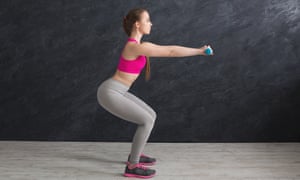Maintain a healthy weight
Essentially, the heavier you are, the greater the impact on the joints and the stronger the muscles have to be to control movements, explains Laura Jamieson, a chartered physiotherapist. Ensuring that muscle-mass percentage is higher than body-fat percentage is crucial to maintaining muscle strength, which helps to ensure you move well. Registered dietitian Sue Baic, a spokesperson for the British Dietetic Association, breaks it down: “For every 0.5kg (1lb) lost, we reduce the weight going through the knee joint at each step by 2kg (4.5lb).” Excess body fat, especially around the abdomen, is also inflammatory, making any osteoarthritis symptoms worse.
Exercise

“A common misconception is that people think exercise will aggravate joint pain,” says Giles Stafford, a consultant orthopaedic hip surgeon at the Wellington Hospital, part of HCA Healthcare UK. But strengthening the muscles around joints is important, says Stafford, especially if you have any issues with them, as it will minimise the pressure on them. Hip problems, for example, can be improved or even prevented by maintaining a good functional range of motion and muscle strength. Stafford recommends body weight exercises such as squats and lunges, and light dumbbell exercises such as bicep curls.
Vary your routine
When it comes to exercise, variety is key. Jamieson recommends a mixture of impact and non-impact cardio for good bone density and strength training (ensuring guidance is sought for correct technique). Yoga can help maintain good mobility but Jamieson says to combine it with other forms of exercise.
Stafford warns against over-stretching: “It can take the joint past its natural physiological range, which can cause damage to the joint and surrounding structures.”
Eat a Mediterranean diet
“Some recent research has suggested that diets high in saturated fat – found in fatty meats and meat products, full-fat dairy, cakes, biscuits, butter and coconut oil – can weaken the cartilage in the knee and hip so that it is more prone to damage and loss of cushioning,” says Baic. She recommends a Mediterranean-style diet, higher in monounsaturated fats such as olive or rapeseed oil, with plenty of fruit, vegetables, wholegrains, nuts and seeds. As omega-3 fat is anti-inflammatory, Baic suggests one to two servings of oily fish each week (or in the recommended dose if taken in oil form). Also pay attention to your vitamin D levels, which are crucial for bone development: it is believed one in five people in the UK have low levels.
Practise good posture
Maintaining good posture is key to preventing joint issues, says Jamieson. “You want to be very careful of your back particularly: there is no surgery that will replace your discs or spine yet.” The NHS publishes an online guidetackling common posture mistakes. It is also important to wear the correct, supportive footwear for exercises and activity.
Since you’re here…
… we have a small favour to ask. More people are reading and supporting The Guardian’s independent, investigative journalism than ever before. And unlike many news organisations, we have chosen an approach that allows us to keep our journalism accessible to all, regardless of where they live or what they can afford. But we need your ongoing support to keep working as we do.
The Guardian will engage with the most critical issues of our time – from the escalating climate catastrophe to widespread inequality to the influence of big tech on our lives. At a time when factual information is a necessity, we believe that each of us, around the world, deserves access to accurate reporting with integrity at its heart.
Our editorial independence means we set our own agenda and voice our own opinions. Guardian journalism is free from commercial and political bias and not influenced by billionaire owners or shareholders. This means we can give a voice to those less heard, explore where others turn away, and rigorously challenge those in power.